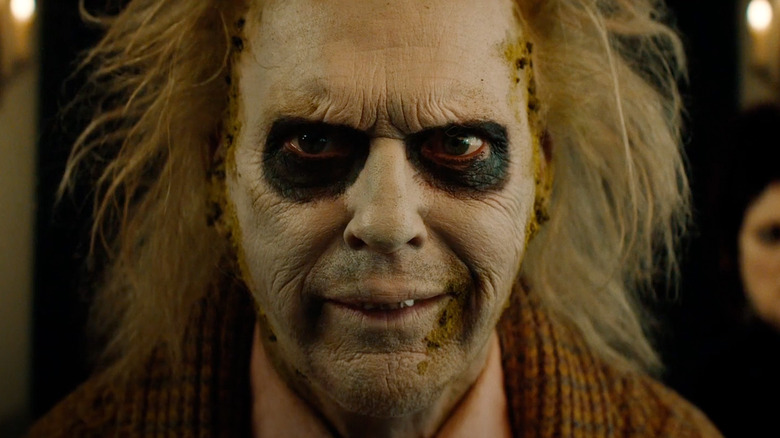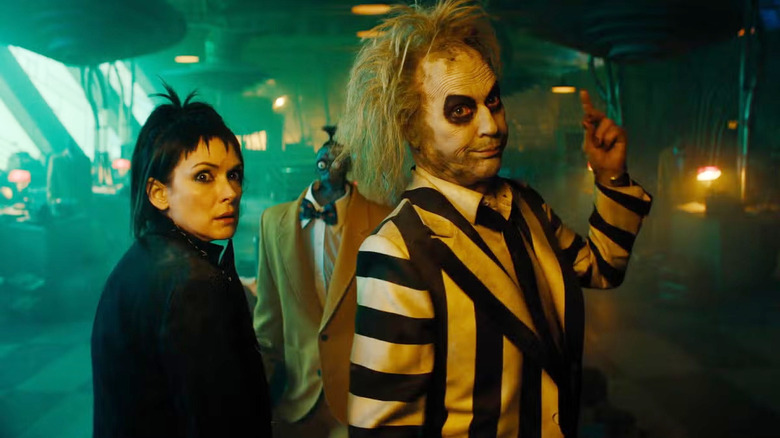Warner Bros. Gave Tim Burton One Condition To Release Beetlejuice Beetlejuice In Theaters
Good things come to those who wait; just ask Warner Bros. The studio and Tim Burton spent close to four decades kicking around ideas for a sequel to the director's classic 1988 horror-comedy "Beetlejuice," ranging from the much ballyhooed 1990s "Beetlejuice Goes Hawaiian" script to "Beetlejuice goes to ... outer space," or so Burton joked (?) in the weeks leading up to this month's "Beetlejuice Beetlejuice." The final version of the sequel has been widely hailed as a long-awaited return-to-form for the maestro of the zany and macabre, both critically and, as WB is no doubt happy to see, financially. But before executives finally said the B-word three times, it appears they came precariously close to scrapping the entire venture.
Much as it can feel like current WB CEO David Zaslav's approach to rejuvenating the legendary studio entails burning most of it down to collect the insurance money, it seems there are still those at Warner Bros. Discovery who actually care about the movies as an art form. In a new report by The New York Times, Michael De Luca and Pamela Abdy revealed that "Beetlejuice Beetlejuice" was actually the first big-budget film they oversaw from start to finish upon being appointed co-chairs of Warner Bros. Motion Picture Group in June 2022. (De Luca and Abdy also took charge of Turner Classic Movies after Zaslav threatened to go full super-villain and completely destroy the treasured defender and champion of classic cinema.) Prior to that, WB was apparently pushing to send the "Beetlejuice" sequel directly to streaming on Max (formerly HBO Max), which was a no-go for Burton. De Luca and Abdy understood this and sought to repair the studio's relationship with the director, but on one condition: He had to keep the film's budget at a reasonable level.
Tim Burton is looking pretty wise right about now
That sound you hear right now is /Film's box office guru Ryan Scott breathing a heavy sigh of relief. Over-spending has been a huge issue for Hollywood in the pandemic era, and even some of the biggest filmmakers in the biz don't always get why that's a problem. With Burton coming off a string of financial disappointments (culminating with 2019's "Dumbo," which almost led him to quit directing movies), De Luca and Abdy said they would give "Beetlejuice Beetlejuice" the theatrical push the director wanted so long as he kept the budget to $100 million — a far bigger sum than the the first film's $15 million price tag, but a comparatively modest one by modern tentpole standards.
While the projected budget for "Beetlejuice Beetlejuice" was initially $147 million, Burton managed to shave off that extra $47 million largely by getting both the returning cast from the original movie (Michael Keaton, Winona Ryder, Catherine O'Hara) and newcomers like Jenna Ortega to agree to a reduced salary in exchange for a bigger piece of the back end profits (something that Burton himself also did). To their credit, De Luca and Abdy moved full speed ahead with pre-production while deals were worked out and Burton did his part to reduce filming costs, which allowed the "Beetlejuice" sequel to quickly start shooting once everything was in place. This, in turn, meant Burton was able to complete almost the entirety of production before the 2023 actors' strikes, keeping the film on track to make its targeted late-summer release this year.
With "Beetlejuice Beetlejuice" having banked more than $250 million in less than two weeks in theaters, Burton, De Luca, and Abdy are all looking pretty wise at the moment, as are the actors who agreed to profit-sharing. (Zaslav and everyone else at WB who spent all that time jerking Burton around, not so much.) That the "Beetlejuice" sequel itself feels legitimately anarchic and less corporate-approved than anything else Burton's made in a hot minute, that's just the green icing on this Gothic cake.
"Beetlejuice Beetlejuice" is currently playing in theaters.

